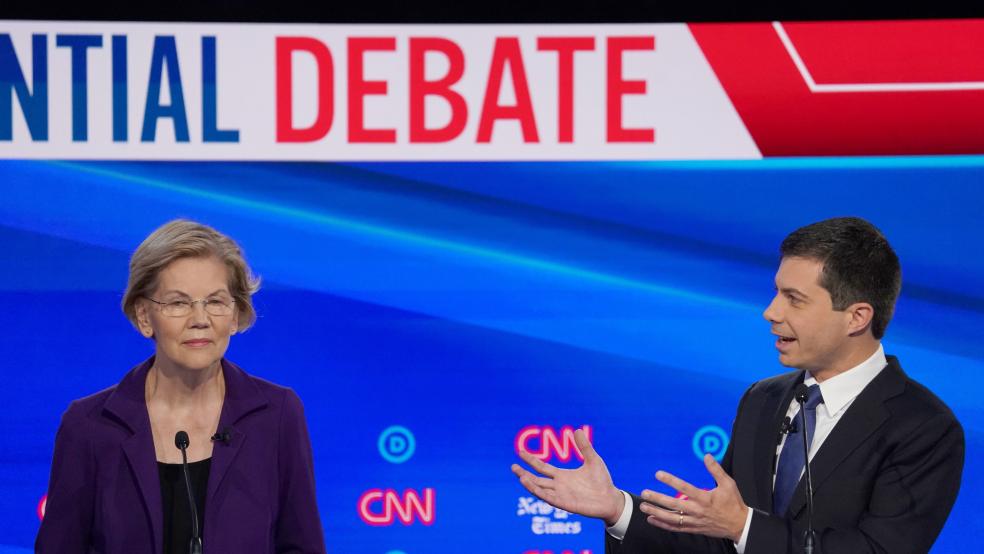Tuesday night’s Democratic presidential debate once again highlighted the candidate’s deep divides over Medicare for All. After opening questions related to the House impeachment inquiry into President Trump, the debate quickly turned to the health care reform plan backed by Senators Elizabeth Warren and Bernie Sanders.
Warren again tried to reframe the question of whether she would raise middle-class taxes to pay for the plan. “Costs will go up for the wealthy. They will go up for big corporations. And for middle-class families, they will go down,” she said. “I will not sign a bill into law that does not lower costs for middle-class families.”
Pete Buttigieg, who last month called Warren “extremely evasive” on the tax question, pounced. “No plan has been laid out to explain how a multi-trillion-dollar hole in this Medicare for all plan that Senator Warren is putting forward is supposed to get filled in,” he said, touting his “Medicare for All Who Want It” proposal as a better alternative. “I don't understand why you believe the only way to deliver affordable coverage to everybody is to obliterate private plans, kicking 150 million Americans off of their insurance in four short years,” he said to Warren. “Why unnecessarily divide this country over health care when there's a better way to deliver coverage for all?”
Warren jabbed back at Buttigieg, saying his “Medicare for All Who Want It” plan is really “Medicare for All Who Can Afford It.”
Joe Biden and Amy Klobuchar, both of whom support building on the Affordable Care Act with a public option, also attacked Medicare for All as expensive and impractical. “The difference between a plan and a pipe dream is something that you can actually get done,” Klobuchar said. “And we can get this public option done.”
Sanders defended his plan — and opened the door for further attacks on Warren. “At the end of the day, the overwhelming majority of people will save money on their health care bills,” Sanders said. “But I do think it is appropriate to acknowledge that taxes will go up. They're going to go up significantly for the wealthy. And for virtually everybody, the tax increase they pay will be substantially less than what they were paying for premiums and out-of-pocket expenses.”
Klobuchar took the opportunity to criticize Warren again. “At least Bernie is being honest here, and saying how he’s going to pay for this and that taxes are going to go up,” she said. “And I’m sorry, Elizabeth, but you have not said that, and I think we owe the American people to tell them where we will send the invoice.”
A political strategy: The attacks on Warren are widely seen as a sign that she’s now the Democratic frontrunner — and they’re likely a sign that, as tiresome as the repeated tax question might get, Warren is going to keep getting asked it by the media, Democratic rivals and Republicans. She’s pointedly not willing to answer directly (or take the bait) and say that she will raise taxes, even as she continues to argue that overall costs under Medicare for All will go down for the middle class. Her caginess on the question suggests she thinks that higher taxes on the middle class, or the very word “taxes,” might be toxic in an election campaign against Trump. But her dodging hasn’t hurt her so far.
What the polls say: The latest Kaiser Family Foundation tracking poll found that 51% of those surveyed favor Medicare for All, while 47% oppose it. A majority of Democrats and about half of independents support a national Medicare-for-all plan, while more than 70% of Republicans oppose the idea. Suport for a public option is higher, at 73%. A CBS News poll released Tuesday found that 59% of voters believe that a government-run plan should "compete with private insurance" as under a public option, while 32% said they would want it to replace private insurance. But polls have also found that support for Medicare for All or other health plans can shift significantly depending on the arguments presented.
The bottom line: Larry Levitt of the Kaiser Family Foundation reminds us that there is no simple answer to the question of ultimate costs, and that a wide variety of outcomes are possible depending on how Medicare for All is implemented. “A Medicare for all plan could be designed so that many people, including those who are middle class, pay less in taxes than they are paying now in premiums, deductibles, and copays,” Levitt tweeted Tuesday. “It depends entirely on the details.”





